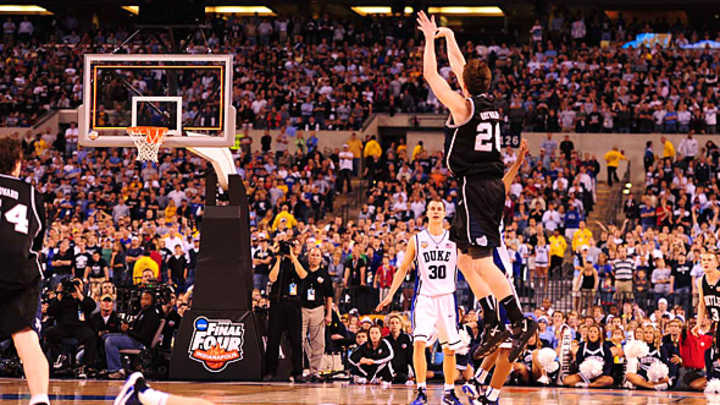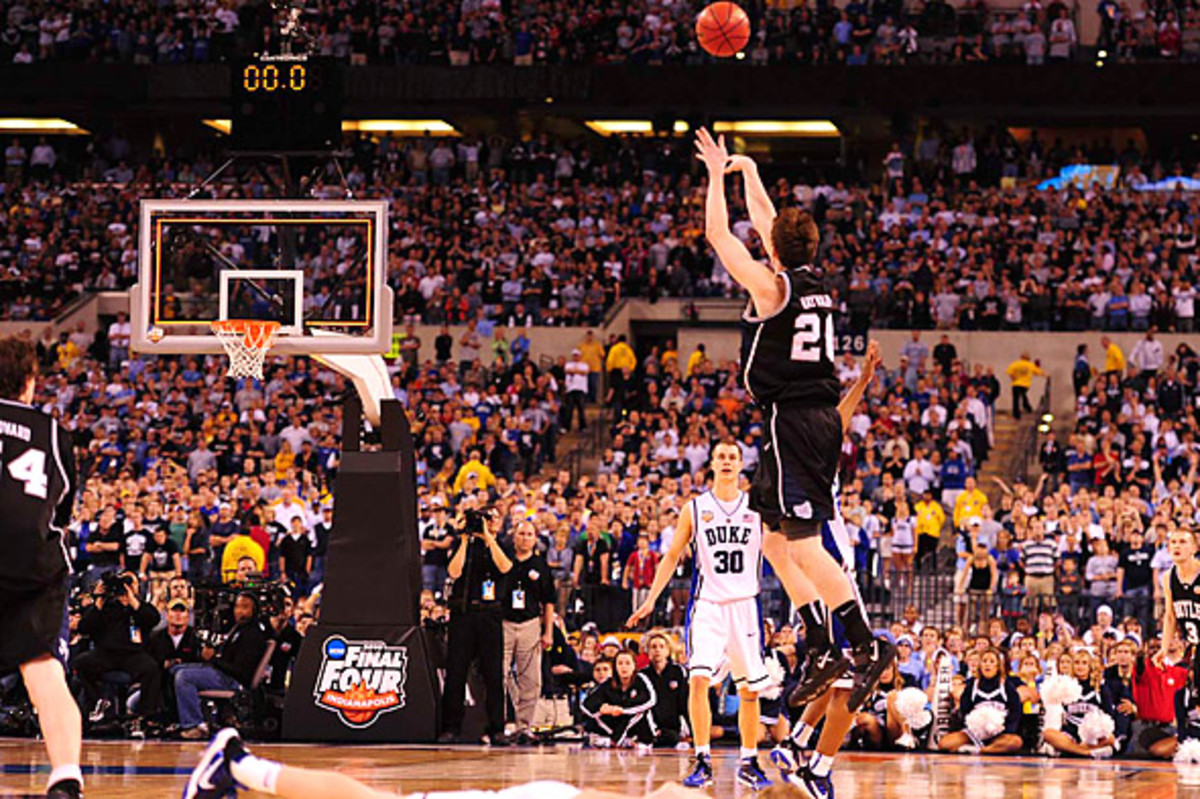The Butler Legend: All But The Miracle


Gordon Hayward's last shot kept more than 70,000 fans at Lucas Oil Stadium in suspense. (John Biever/SI)
INDIANAPOLIS -- The interior walls of Lucas Oil Stadium are made of concrete so thick that when you stand in the back tunnels, you can barely hear the noise from the basketball court. Outside Butler's locker room in the wee hours of the morning after the national championship game, the sounds from the floor were distant and muddled. Coach K was on a microphone on some unseen stage, speaking about a "great basketball game." About how he wanted to congratulate both teams. It was difficult to make out the rest. In response to K's lines, the Duke crowd would roar, just loud enough for those cheers to creep down the tunnel, and sting.
To get to that tunnel, to wait for the Bulldogs to emerge and try to explain the heartbreak of a one-possession, one-missed-shot, 61-59 loss in one of the greatest NCAA championship games ever, you had to pass rows of devastated Butler students. One of them leaned on the railing, suspended in disbelief, as if Gordon Hayward's half-court heave were being re-enacted, on loop, rather than the real scene that was unfolding: Duke players hugging, rejoicing, wearing flat-brimmed championship hats. "That shot almost went in, didn't it," he said. "He really almost did it."
Another Butler student stood in the back of that section, frozen, defiantly making a No. 1 sign, pointing toward Lucas Oil's roof. He was clinging to an alternate reality, one in which Hayward's aim was true, and what might've been the greatest buzzer-beater of all-time didn't hit backboard, front rim, and then floor. Michael Kaltenmark, the man in charge of parading around Butler Blue II, the school's English Bulldog mascot, waited outside the locker room, too. He had been told to lead Blue II up near the bench in case Butler pulled off a comeback; CBS had requested that the dog be at center-court during the celebration. "It didn't happen," Kaltenmark said, "so I had to pick [Blue II] up and rush him out. I tried to get a response out of him, but he was stone cold." The tension in the room as the Hayward's prayer hung in the air had been so palpable, so unlike anything we'd ever experienced on a final shot, that even a canine could feel its painful release.
Soon, three Butler players emerged -- Hayward, Shelvin Mack and Avery Jukes -- and tried to keep their composure as they boarded golf carts for their press conference. Coach Brad Stevens did his obligatory loser's-locker-room interview with CBS, and said of his players, "What they've done together will last a lot longer than one night."
Butler -- America's team, the underdog, David, Cinderella, Hoosiers, whatever you prefer -- did not win, for the first time in 26 games, the first time since Dec. 22. Duke won the national title not because of referees, or luck, or some cruel decree of the basketball Gods. The Blue Devils won because they were the nation's best team this season, and the only team in this dance to break the 60-point barrier against the Bulldogs' D. They won because Kyle Singler battled against Willie Veasley's defense for 19 points, and Brian Zoubek grabbed six offensive rebounds, and Jon Scheyer dished out five assists and only turned the ball over twice while being dogged by the indefatigable Ronald Nored. Those who pulled for Butler should begrudgingly admit that Duke was good, and a deserving champ.
But those who went on this ride with the Bulldogs, through San Jose and Salt Lake, and back home to the warm embrace of Indianapolis, should take solace in the fact that Stevens is right: What they did here will transcend the evening. Butler's story, even without the fairy-tale ending, will have the more lasting impact from this NCAA tournament. There are 347 teams in Division I, and most of them are incapable of feeling a kinship with the Empire in Durham. They will never have Duke's money (the nation's biggest hoops budget, at $13,873,859), Duke's Olympic team coach, Duke's McDonald's All-Americans. What those teams can do is draw inspiration from Butler, a mid-major with 13 home-state kids on its roster, only one of them a ranked recruit; a budget one-eighth the size of Duke's; and a 33-year-old coach who quit a safe corporate marketing job to take a risk on basketball, and had it pay off in a way that he could never have imagined.
"Teams are going to see what we did and know that they have a shot," Nored said. "They can know that if they play together, and do the right thing, and listen to their coach, they have a great shot at doing something special."
This tournament was special because of Butler. The Bulldogs did not beat Duke. But they were there, on the last night of the season, going toe-to-toe with Duke, proving that the only difference between them and the Blue Devils was a few inches on the flight path of the game's final shot. Butler was there because it beat higher-seeded, BCS-conference powers Syracuse, Kansas State and Michigan State in succession, putting on clinics of man-to-man defense, with all five players knowing exactly when to help one another.
Butler is an inspiration to mid-majors everywhere, real-life evidence that it can be done. Whether or not they want to shoot for a Final Four repeat is up to them. It's up to Hayward, if he wants to stay for another season (he said he'd "look at what the best situation was" for him regarding the NBA draft). It's up to Stevens, if he wants to spurn a mega-offer from Oregon that will inevitably come this week (he said he'd say "hello" to any athletic directors that came asking, and go from there). If they stay at Hinkle Fieldhouse, The Bulldogs have true powerhouse potential, and the ability to blur the line between big- and small-conference teams like never before.
It's hard to grasp the big picture though, when your coach stresses living game-to-game, possession-to-possession, moment-to-moment, and the last moment is so tough to stomach. Veasley, a senior, took it hardest, sitting in the corner of the locker room with his head buried in his jersey, sobbing. Near him was a whiteboard that had been wiped nearly clean, so that it showed only faint markings of a giant "20" -- the halftime message that, as they trailed 33-32, only 20 minutes of basketball played the Butler Way stood between them and a national championship. When Veasley finally came up for air, he explained what had been running through his mind. "It just hit me," he said, "that it was over."
The end had come without one of those Butler Plays that saved them against Murray State (Hayward's deflection and dive to ruin the Racers' final possession), Syracuse (Veasley's improbable tip-in over the Orange's trees) and Kansas State (Nored's key, late steals and layup) and Michigan State (reserve Shawn Vanzant's offensive rebound and assist to Hayward). Matt Howard scored two point-blank buckets (one at 1:44, the other at 55 seconds) to cut Duke's lead to one, but nothing more was in the script: Hayward missed a fadeaway, baseline jumper with seven seconds left, and no Bulldog could sky above the 7-foot Zoubek to create a second-chance opportunity. Because the Bulldogs had such supreme confidence in themselves during crunch time, Veasley said, "It almost seems unreal that we lost, because I was so used to us finding ways in moments like that to pull it off.
"I was waiting for that to happen in those final seconds, and it didn't. That last thing that usually happens just didn't."
And so they were left to retreat to the locker room, to console each other while Duke pranced on confetti, and Coach K talked to the crowd. Behind closed doors, in their own huddle, each of Butler's seniors had a chance to speak. Walk-on Nick Rodgers thanked them for letting him ride their coattails for four years; Jukes said it was amazing to be a part of something bigger than himself, not just on the court, but as a family. When it was Veasley's turn, he choked up. Rodgers decided to make a joke -- he asked Veasley if he needed a towel to cry into, and threw him a warmup jacket -- and after some laughter, Veasley found his voice enough to say how thankful he was to have been a part of this run.
In a more serious gesture, Rodgers had given something to Nored prior to the game: an Easter prayer card, on the back of which he'd written, "More than Conquerors." It was a message from the pastor who'd visited the team for a Sunday sermon, and spoke of a boy battling leukemia who always used the phrase from Romans, Chapter 8: "In all these things we are more than conquerors." Nored, the sophomore point guard who will be back to lead the Bulldogs' next Final Four run in 2010-11, left the prayer card sitting in plain view on the top shelf of his locker as he fielded questions about the loss.
